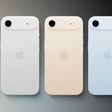Apple Backpedals, Puts "All Eligible Products" Back on EPEAT Environmental Registry
Last week, Apple notified the Electronic Product Environmental Assessment Tool (EPEAT) that it was withdrawing its products from the EPEAT registry, and would no longer be submitting its products for evaluation. EPEAT measures the environmental impact of electronics and is used by many corporations and governmental organizations as a yardstick on enterprise purchases.
In one well-publicized instance, the city of San Francisco said it would no longer purchase Macs without EPEAT certification.

In an unusual about-face, Senior Vice President of Hardware Engineering Bob Mansfield wrote an open letter reversing the decision to remove Apple products from the EPEAT registry.
We’ve recently heard from many loyal Apple customers who were disappointed to learn that we had removed our products from the EPEAT rating system. I recognize that this was a mistake. Starting today, all eligible Apple products are back on EPEAT.
It’s important to know that our commitment to protecting the environment has never changed, and today it is as strong as ever. Apple makes the most environmentally responsible products in our industry.
We've received word that Bob Mansfield is sending a copy of the letter, from his @Apple.com email address, to customers who had expressed concern over the EPEAT withdrawal.
A full list of Apple's EPEAT-rated products is available, and includes the latest releases of the MacBook Air and the MacBook Pro with Retina Display.
EPEAT CEO Robert Frisbee also wrote a letter confirming Apple and EPEAT's commitment to working together and hinting at future changes to the EPEAT judging process to work with Apple as it continues its cutting edge computer designs.
We look forward to Apple’s strong and creative thoughts on ongoing standards development. The outcome must reward new directions for both design and sustainability, simultaneously supporting the environment and the market for all manufacturers’ elegant and high-performance products.
An interesting question for EPEAT is how to reward innovations that are not yet envisioned with standards that are fixed at a point in time. Diverse goals, optional points awarded for innovations not yet described, and flexibility within specified parameters to make this happen are all on the table in EPEAT stakeholder discussions. And of course, timely standards development, as with newly created Imaging Equipment and Television standards, and the current refresh of the PC/Display standard, is critical as well.
Slate's Farhad Manjoo called the entire EPEAT situation a "really strange unforced error."
Popular Stories
Since the iPhone X in 2017, all of Apple's highest-end iPhone models have featured either stainless steel or titanium frames, but it has now been rumored that this design decision will be coming to an end with the iPhone 17 Pro models later this year.
In a post on Chinese social media platform Weibo today, the account Instant Digital said that the iPhone 17 Pro models will have an aluminum...
Apple is continuing to refine and update iOS 26, and beta three features smaller changes than we saw in beta 2, plus further tweaks to the Liquid Glass design. Apple is gearing up for the next phase of beta testing, and the company has promised that a public beta is set to come out in July.
Transparency
In some apps like Apple Music, Podcasts, and the App Store, Apple has toned down the...
In select U.S. states, residents can add their driver's license or state ID to the Wallet app on the iPhone and Apple Watch, providing a convenient and contactless way to display proof of identity or age at select airports and businesses, and in select apps.
Unfortunately, this feature continues to roll out very slowly since it was announced in 2021, with only nine U.S. states, Puerto Rico,...
Apple will launch its new iPhone 17 series in two months, and the iPhone 17 Pro models are expected to get a new design for the rear casing and the camera area. But more significant changes to the lineup are not expected until next year, when the iPhone 18 models arrive.
If you're thinking of trading in your iPhone for this year's latest, consider the following features rumored to be coming...
Apple is expanding the ability to add an Apple Account Card to the Wallet app to more countries, according to backend Apple Pay changes.
With iOS 15.5, Apple updated the Wallet app to allow users to add an Apple Account Card, which displays the Apple credit balance associated with an Apple ID.
If you receive an Apple gift card, for example, it is added to an Apple Account that is also...
Three out of four iPhone 17 models will feature more RAM than the equivalent iPhone 16 models, according to a new leak that aligns with previous rumors.
The all-new iPhone 17 Air, the iPhone 17 Pro, and the iPhone 17 Pro Max will each be equipped with 12GB of RAM, according to Fixed Focus Digital, an account with more than two million followers on Chinese social media platform Weibo. The...
Apple should unveil the iPhone 17 series in September, and there might be one bigger difference between the Pro and Pro Max models this year.
As always, the Pro Max model will be larger than the Pro model:iPhone 17 Pro: 6.3-inch display
iPhone 17 Pro Max: 6.9-inch displayGiven the Pro Max is physically larger than the Pro, it has more internal space, allowing for a larger battery and...
The calendar has turned to July, meaning that 2025 is now more than half over. And while the summer months are often quiet for Apple, the company still has more than a dozen products coming later this year, according to rumors.
Below, we have outlined at least 15 new Apple products that are expected to launch later this year, along with key rumored features for each.
iPhone 17 Series
iPho...





















